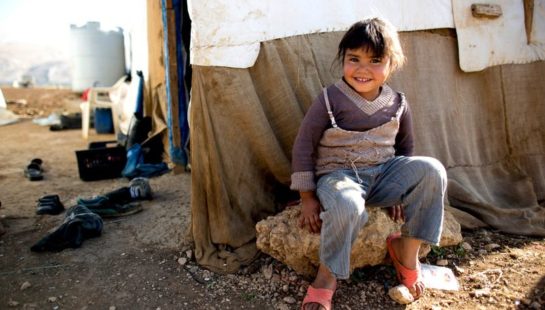“The virus doesn’t seem to be affecting children in any severe way…”
It’s a refrain we’ve heard many times over the last few months. For some unknown reason, puzzling even to health experts, children the world over have been largely spared from the crippling health impacts of COVID.
This is good news. But sadly, it does not mean they’re safe from the potentially catastrophic impacts that come with this pandemic. In fact, they’re some of the most vulnerable in this regard.
Here are just three of the unexpected ways that we are seeing children impacted by the virus around the world.
Child Marriage
The UN suggests that as many as 13 million additional child marriages may occur globally as a result of the coronavirus pandemic. You might be wondering how there could possibly be a link between coronavirus and child marriage?
Let me explain
In the international development world, we sometimes talk about things we call ‘negative coping mechanisms’. These are basically exactly what they sound like: the difficult, painful, and ultimately devastating decisions that people are forced to make in order to cope with the unexpected crises they face in life. So, when any disaster strikes, we need to consciously look at both the immediate impact that it has on children, families, and other vulnerable people, and also at the fallout that can come from the impossible decisions families are forced to make when they run out of options for their survival.
Right now, in Australia, as we see dramatic increases in unemployment and underemployment, it’s painfully easy for us to imagine what it feels like when our normal sources of income are disrupted… but imagine for a moment what that looks like when you and your family depend on the wages from insecure daily labour to put food on the table… when your savings are limited… when you have no assets left to sell… and importantly, when your government has very limited ability to provide welfare support.
That’s what coronavirus looks like for many – too many – families around the world. And when families reach the point where they simply can’t afford to put enough food on the table, they are forced to look at any way to ensure their children can survive.
This is where the increase in child marriage can come in. Too often, the only choice parents have left is to look for an older and marginally wealthier man who is ready to marry their young daughter and take on the responsibility of providing for her. It’s often hoped that this will relieve the burden just slightly on the household food supplies, and hopefully mean she will continue to eat in the short-term. But given we know child brides are almost certain to drop out of school, that they are likely to fall pregnant before their bodies are fully ready, and that they are at greater risk of domestic violence… it must be asked, “At what cost?”
Child Mortality
Another study looked at the significant disruption to the provision of regular health services in the midst of the pandemic. This is partly because health programs have been paused, partly because people are too nervous or can’t afford to access them, and partly because the supply chains for essential items like vaccines have been impacted in some parts of the world. This study conservatively estimates that if there is just a 15% reduction in routine childhood vaccines over the next six months, it is likely to lead to an additional 253,500 children under 5 dying.
Child Nutrition
And then there’s the impact on nutrition. This is felt in a variety of different ways – including the disruption to family incomes we talked about earlier. But one of the surprising ways children are being affected, comes in the link between schools and nutrition.
School closures have perhaps been the most controversial element of the coronavirus response in Australia, as both governments and families have tried to find the right balance between concern for children’s health and concern for their learning and social connection. Not to mention working out how to accommodate the mental health – and employment realities – of parents!
Again, we see that the challenges we face here are the same that children are facing across the world, but again not everyone experiences these impacts in the same way. There are very real and direct impacts on children’s education from school closures, but one of the other elements you may not have considered is the way this can link to nutrition. The World Food Programme estimates that nearly half of all school children in low and middle income countries receive a daily meal at school – that’s around 310 million children. Consider the impact of that…one World Food Programme study showed that as a result of a school meals program in India, protein deficiency was eliminated, there was a 30% reduction in calorie deficiency, and a 10% in iron deficiency. These are nutritional gains that families will struggle to maintain without this assistance.
What Are We To Do?
All of this can leave us feeling pretty despairing… especially when many of us may have been holding on to the small glimmer of hope that at least coronavirus didn’t seem to be going after children. The reality is that, right now, in ways that neither you nor I would choose, the global family has become one. Whether young or old, rich or poor, we have this very visceral reminder that as a human family we stand together in facing a virus that impacts everyone – but as we’ve seen this impact is not fairly distributed.
One piece of good news is that our long experience of working with children and youth at Baptist World Aid, has shown us time and again that they are not passive victims – they are creative, dynamic leaders of change when given even half an opportunity. Over the months and years ahead, alongside the stories of pain and devastation, we know will also hear stories of initiative, creativity, and change led by children… if we only take the time to notice them. My job, your job, is simply to all find the ways we can stand with children and their families and communities, as they face down coronavirus.
And that’s why Baptist World Aid will soon be working together with Micah Australia (and many others across the country) to ensure the Australian Government extends its strong local response, to include standing alongside countries in our region and beyond. And support them to put in place the measures to respond to the immediate crisis, and also ensure that their economies, health, and education systems continue to function.
It’s why we need to work with businesses through initiatives like the COVID Fashion Commitments, to encourage fashion brands to do everything they can to support the workers in their supply chains. So that these workers can continue to access decent employment and the income they need to keep families healthy and safe.
And it’s why Baptist World Aid is working closely with our Christian partners across the world to enable them to respond immediately to the urgent need for health and hygiene activities, as well as emergency food. And importantly, we are also working with them to adapt and sustain long-term programs so that children can continue to realise their rights… and so that families and communities can flourish and enable children to thrive.



 Matthew Smeal
Matthew Smeal